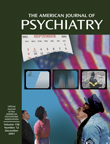To the Editor: Barbara Karp, M.D., et al.
(1) reported that “adolescents with schizophrenia had a high frequency of neurologic abnormalities. Neurologic signs decreased with age in the healthy comparison subjects but not in the subjects with schizophrenia” (p. 118). The research design of this study did not permit the authors to make these statements because “diagnostic status” was confounded with “level of intellectual functioning” and with “medication/clinical status,” both of which could have significant effects on the dependent variable, neurological test performance.
In this study, 21 adolescents with schizophrenia were compared with 27 “healthy age- and sex-matched” (p. 118) normal comparison subjects. The schizophrenia group had a mean full-scale IQ of 77 (range=48–120), while the normal group had a mean full-scale IQ of 121 (range=97–141). Therefore, “diagnostic status” is confounded with “level of intellectual functioning.” The neurological abnormalities found in the adolescents with schizophrenia may have reflected poor intellectual functioning, which may or may not have been independent of their diagnosis of early-onset schizophrenia. Furthermore, the schizophrenia subjects “were examined after at least 1 week with no medication,” and the examiners were not blind to patient diagnosis “because of active psychotic symptoms in the patients” (p. 119). Consequently, there may have been medication withdrawal effects on neurological test performance, and active psychotic symptoms may have interfered with the subjects’ ability to attend to and follow the examiner’s instructions. The statement that examiners could not be blind to diagnostic status because of active psychotic symptoms in the adolescents with schizophrenia whose medication had been withdrawn underlines the problem of conducting a neurological assessment under these conditions.
Another problem with this study was the inclusion of four “healthy age- and sex-matched comparison subjects” aged 10 and 11 years, even though there were no 10- or 11-year-old adolescents with schizophrenia to whom they could be matched. According to Figure 1, these additional young normal comparison subjects contributed significantly to the negative correlation between “number of neurologic signs” and “age of subject.” Without these subjects, the finding pertaining to abnormal “maturation,” which is featured in the title, may have failed to reach the p=0.05 significance level.
A more accurate description of the results of this study might read as follows: “Actively psychotic adolescents with low IQs and early-onset schizophrenia who were withdrawn from medication had a higher frequency of neurologic abnormalities than normal adolescents with normal IQs.”

